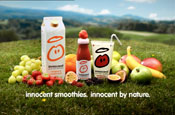
The report revealed that premium-priced glucose and stimulant drinks, sports drinks and smoothies recorded the biggest growth last year, as consumers sought healthier options.
Consumers also continued to choose natural sugar over artificial sweeteners; regular drinks increased their market share by 1% to 78%, at the expense of diet and no-added-sugar variants.
To capitalise on this, Pepsi is rolling-out 'premium' cola Pepsi Raw, which uses cane sugar and contains no artificial preservatives, colours, flavourings or sweeteners.
The value of the sports-drink category rose by 16% to £154m, with category leader Lucozade's overall sales up 14% to £338m.
Brands looking to benefit from this strong performance include Pepsi's Gatorade, launching this summer, and Powerade, which grew 39% to £31m last year.
Red Bull's sales rose 23% to £170m, boosting growth in the glucose and stimulant-drinks category by 25% to £481m. After doubling in 2006, value growth of smoothies slowed to 31%, with Innocent still leading the £214m category.
'The strongest performers in take-home were drinks offering functional benefits, which command a price premium,' said Andrew Richards, customer management director at Britvic.
According to the report, sales growth this year will be driven by impulse outlets, such as co-ops and convenience stores, where sales rose by 7% and 6% respectively.
Britvic Soft Drinks Report 2008: Key findings in the take-home sector
- Despite the worst summer on record, the soft drinks market grew 2.8% to £6.07bn in 2007.
- Cola remained the number one sub-category, growing its share of the market by 2% to 21% and achieving sales of £1.25bn.
- However pure juice continued to close the gap on cola, increasing its take-home share by 5% to 17% and achieving sales of £1.04m.
- After 7% growth in 2006, juice drinks slowed last year growing only1% to £671m.
- Premium-priced glucose and stimulant drinks, sports drinks, and smoothies saw the biggest growth last year, as consumers seek healthier options.
- The sports drink category increased 16% to £154m, driven by category leader and second biggest take-home brand, Lucozade, up 14% to £338m.
- Red Bull, which grew 23% to £170m, boosted growth in the glucose and stimulant drinks category, which increased by 25% to £481m.
- After doubling in 2006, value growth of smoothies slowed to 31% last year, with Innocent - up 46% to £141m - still leading the £214m category.
- A decline in fruit-carbonates sales continued last year with sales down 2% to £438m. Lemon and lime variants, however, performed well, with 7UP growing 14% to £28m.
- Regular drinks increased their share over diet and no-added sugar variants for the third consecutive year, growing 1% to 78% of the total soft drinks market.
- Sales of plain bottled water declined 3% to £463m; among the top three brands only Evian grew (up 4%).
- The wet summer impacted on squash sales too with sales down 7% to £435m. Consumer preference for no-added-sugar ranges meant regular squashes were harder hit.
- After consecutive years of growth, dairy drinks declined 3% to £379m. Last year's success story, probiotics, fell 9% in both value sales and volume share.
- After double-digit growth in 2006, sales of the water-plus category (water with flavours or functional benefits) declined 11% to £154m. The decline was driven by flavoured water, accounting for 99% of the category, while functional water (which offers added benefits such as vitamins or energy) grew 94% to £2m.
- Non-fruit carbonates grew 3% in value to £146m; lemonade declined 2% to £135m, mixers grew 3% to £108m; and cold hot drinks (mainly iced tea and coffee) declined 23% to £7m
- Source: Britvic/Nielsen


.jpg)


.jpg)